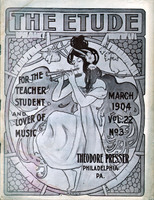BY JACQUES DE LYONS.
The ancient Egyptians speculated upon astronomy as the "Harmony of the Spheres." They theorized a systematic relationship between the seven-toned diatonic scale, as they formulated it, and the seven planets; the ratio between the highest tone of this scale and the lowest they believed to be the same as that between Saturn, the most remote of these planets, and the moon, which was the nearest.
This may have been all moonshine; but the Greeks held something of the same idea which Pythagoras imported when he returned from his twenty years' course at the College of Priests at Niebes. Plato and Aristotle conceived music as including astronomy, and so taught.
For many centuries this beautiful belief or fancy— who shall decide it for us?—cast its glamor over the thought of mankind. Rubinstein, in one of his quartets for strings, has entitled the slow movement "Spheren Musik" (the music of the spheres)—a very grateful and gracious piece of writing (without Egyptian local color, since the planets are cosmopolitan) in which the harmony of the spheres is sweetly maintained, con sordini, etc. But it is not this of which I want to speak to you.
Music hath her stars; when they shine the heart of man is glad (if he can afford it); and when they do not appear there is gloom (unless the money is refunded). I sometimes wonder if astronomic conditions, which, as the weatherwise tell us, improvise so movingly upon our seasons; I wonder, I say, if they exercise the same sway on the mental atmospheres—the pulse of some of our ultra composers, the temperatures of certain up-to-date compositions. I recently read that a musical scientist in England maintains that the typical rhythms of the masters are practically the same in unit of time as the pulse of a healthy person. This being the case, metronome 132 would with fair faithfulness indicate the fever— if not frenzy—of some of our modern works. But it is not this of which I wish to speak to you.
Study the stars—not mathematically for musical analogy—but by the telescope of the imagination, the eye of the spirit. Study them in their reflection upon earth. Take the spectrum of their light in the heart of a child. Use, also, the microscope of loving and sympathetic insight; and ponder well what you thus discover.
"What does that piece say to you?" I asked a gifted child to whom I had given the familiar "Melodie" of Massenet as a study in left-hand lyric flexibility. Quickly flashed the answer, as the expression of a picture already in the child's mind: "The cat wants the bird, and she wants it, oh! so much." Invest a little money in that child's music study, practical papa; it will bring you a good round return.
But if a caller, overhearing your other daughter practicing a Chopin nocturne, should mistake it for a pianola, and if that mechanical girl should regard this as a compliment, then go right away into the dark and think it over. Household economics is a good study for some girls. Many a good cook is wasted on music; and, alas, many a good musician is wasted—not so many either, for cooking in its finest potencies is all the better done, I verily believe, by virtue of the careful training that good musicianship calls for to-day. Accuracy, fine discrimination, a delicate control, neatness, and sense of symmetry, these, for example, are very practical and widely applicable characteristics. Therefore see to it that, in your musical work, you build character. Thresh this out with your friends.
Meanwhile and always, and for unfailing messages of analogy in your tone-life: study the stars! Soon you will look upon bare boughs and clean cloud- white snowdrifts; and ice will petrify the ponds; and the stars will shine keenly and with piercing brilliance. You have the cool, clear spirit of the classic in the winter aspect of nature; the structural boughs of music, the oral colorless masses of noble form, the phrasing of freezing. But let a sunrise or a sunset add its revelation upon the snow and ice! Then what glories!
Ah! music hath her seasons! Summer with its dews upon the fragrant flowers and its lulling lapping of the lake waters and its tender, soothing stars. Romance and poesy awake and fill the heart of man with blissful vision and haunting voices.
Once more, and finally, come out with me and study the stars. Look long and intently; send your gaze up toward the invisible. Awesome it is; thrilling; well-nigh bewildering. But steady yourself and look with your soul! So should you approach the masters; a master mind is a firmament; a master work is as a planet; a master heart is as the starlight. Give heed; hide not; neither vaunt yourself.



